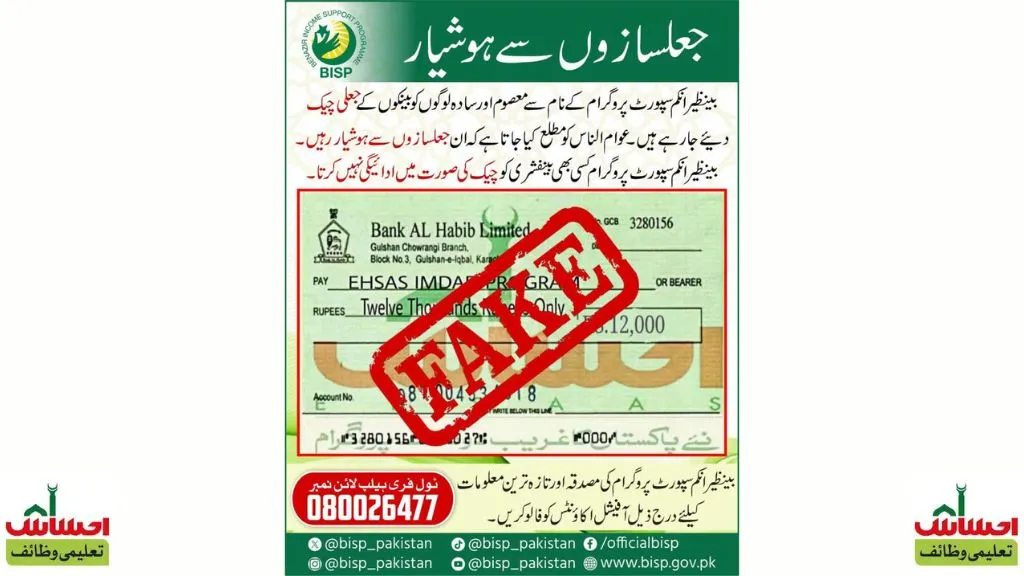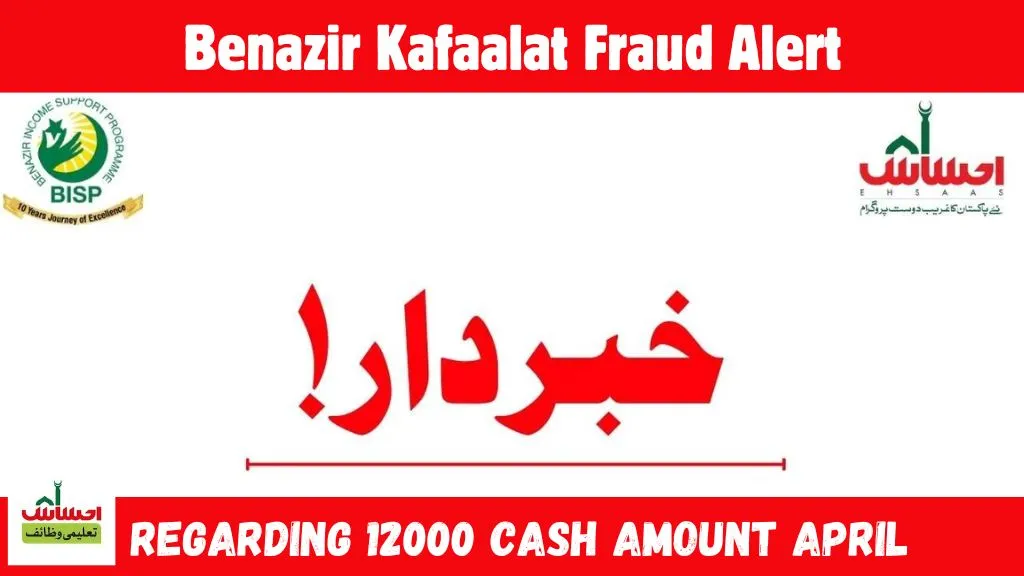Lately, there has been a concerning surge in deceptive schemes preying on unsuspecting individuals, masquerading as government aid programs. One such crucial initiative, the Benazir Income Support Program (BISP), designed to offer financial assistance to eligible households in Pakistan, has unfortunately become a focal point for scammers. This article aims to raise awareness among the public about the latest fraudulent ploy masquerading as BISP, particularly concerning false promises of distributing a cash amount of 12,000 in April.
Benazir Kafaalat Fraud Alert
Beware of fraudulent activities exploiting the name of the Benazir Income Support Programme. Scammers are distributing fake bank checks to unsuspecting individuals. It’s crucial to stay vigilant and informed about these deceptive practices. Notably, the Benazir Kafaalat Programme does not issue payments in the form of checks.

Understanding the Fraudulent Scheme
Scammers prey on vulnerable individuals, offering financial assistance through illegitimate means. They may contact potential victims via phone calls, text messages, or doorstep visits, claiming to represent government programs like BISP. These fraudsters exploit people’s financial hardships by promising substantial cash amounts.
Also Read: New Update 2024: Check Your Eligibility for the 8171 Ehsaas Program Online via CNIC
How the Fraud Works
The fraudulent scheme typically follows these steps:
- Initial Contact: Scammers pose as representatives of BISP or related organizations, reaching out to potential victims.
- False Promises: They entice victims with promises of significant cash amounts, often citing specific sums like 12,000 rupees, purportedly to be distributed in April.
- Request for Personal Information: Victims are asked to provide sensitive information, such as bank account details or identification documents, to process the payment.
- Issuance of Fake Checks: Some fraudsters may provide fake bank checks or demand payment for processing fees, falsely claiming it’s necessary to receive the promised funds.
- Financial Loss: Once victims comply with demands and provide information or payments, the scammers vanish, leaving them with financial losses and potential identity theft risks.
To safeguard against such scams:
- Verify Sources: Authenticate communications claiming to be from government agencies like BISP. Cross-check provided contact details with official channels and websites.
- Exercise Caution: Be cautious of unsolicited offers of financial assistance, especially if they request personal information or upfront payments.
- Educate Yourself: Stay informed about common scam tactics and be wary of offers that seem too good to be true.
- Secure Personal Information: Refrain from sharing sensitive data with unknown individuals or entities.
- Report Suspicious Activities: If you encounter suspicious activity or believe you’ve been targeted by fraudsters, promptly report it to relevant authorities or law enforcement agencies.
Conclusion:
Stay vigilant against fraudulent schemes masquerading as government assistance programs like the Benazir Income Support Programme. By remaining cautious, verifying sources, and safeguarding personal information, individuals can protect themselves from falling victim to scams and financial losses.
FAQs:
- How can I verify if a communication claiming to be from BISP is genuine?
- Ans: You can verify the authenticity of communications by cross-checking the contact details provided with official channels and websites of BISP. Additionally, government agencies often have helplines or online portals where you can confirm the legitimacy of such communications.
- What should I do if I suspect I’ve been targeted by scammers pretending to be from BISP?
- Ans: If you suspect fraudulent activity, refrain from providing any further personal information or payments. Immediately report the incident to relevant authorities or law enforcement agencies. Additionally, you can contact BISP directly to inform them of the situation and seek guidance on further steps to protect yourself.

